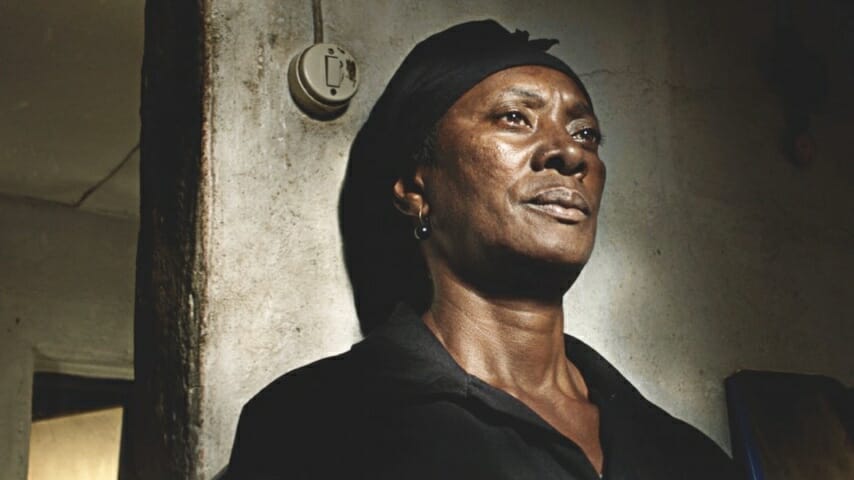
Black is the dominant color in Pedro Costa’s new film, Vitalina Varela. Everyone wears black: black pants, black shirts, black hats and head scarves, a black leather jacket, the mutual wardrobe occasionally disrupted with a splash of yellow or a light touch of blue. Black engulfs the set design, wreathing the picture in oppressive, atmospheric darkness, which blends together with Costa’s dreamy-bordering-on-surreal filmmaking and lends the sense that his audience is trapped in the collective nightmare of the characters populating the Portugeuse master’s story.
But if black defines the visual tone in Vitalina Varela, it’s stillness that provides the picture’s structure. Costa shot Vitalina Varela using an aspect ratio close to the Academy ratio (1.33:1 instead of 1.37:1); the result is a movie almost squarely framed, and from that comes the feeling of being hemmed in. There’s very little room to breathe, much less move around. Every shot Costa composes could, if he liked, occupy real estate on a gallery wall in an overpriced metropolitan museum where refined white culturalists could gaze on them and marvel at the relentless destitution captured through his lens. But Costa is in the business of cinema, and so the images do move, but so slowly and so haltingly that they practically read as still anyways.
Calling Vitalina Varela’s holistic effects “suffocating” wouldn’t do Costa’s work any justice. “Stifling” would seem to better suit the film’s intentions: Life in Lisbon’s utterly devastated Fontaínhas shantytown is a parade of smothered humanity. Residents march, shamble and occasionally lie prone on the ground, faith depleted, energy drained. Why anyone would return here after spending decades away is a question Costa answers within its first 10 minutes, when the title character, named for the actress who plays her, touches down on the tarmac and is immediately met with bad news. “Vitalina, you arrived too late,” one of the airport workers serving as the welcome wagon tells her. “Your husband was buried days ago. There is nothing in Portugal for you.”
The movie opens with the funeral procession, with men shuffling through the winding streets, paying their respects, literally cleaning house. Viewers know what’s waiting for Vitalina before she does. Most people would probably buy a return flight on the spot, but Vitalina remains. She’s determined to embrace that nothing with unfailing stoicism and cool, steely judgment. Vitalina’s angry. She’s heartbroken. For 40 years, she lived alone in Cape Verde, her husband, Joaquim, having abandoned her and fled for reasons none of us watching from our couches can appreciate (or even comprehend). Now, at long last able to reunite with him, she finds that she’s inherited the mess—worldly and spiritual—he left with his passing: the house he built for them, but also the demons he collected over the course of their separation.
Each person who comes to Vitalina’s door has demons of their own, too, and the town’s priest (played by Ventura, a regular player in Costa’s films), having lost his faith as well as a chunk of his mind, is ill-suited to exorcise them. No one the audience meets is free from grief, the emotion for which the movie’s pervading darkness functions as an avatar: There’s nothing here for Vitalina other than the task of reconciliation, but quite frankly, there’s nothing here for literally anybody else, either, save for the pain they’ve acquired through impoverished reality.
Withstanding the procession of Vitalina Varela’s suffering requires patience and endurance, two key qualities required to watch most of Costa’s work: His movies require a great deal of attention, and if you’re finally watching Vitalina Varela now that Grasshopper has made it available via streaming, that goes for double considering all of the distractions of home viewing both in general and under the specific circumstances of life in the time of COVID-19. But Vitalina Varela is essential filmmaking from an essential filmmaker, and maybe the way Costa and Varela explore grief’s every nook and cranny will yield unexpected relief from our own. If nothing else, the impeccable craftsmanship is breathtaking, and if that’s not reason enough to seek out great cinema, nothing is.
Director: Pedro Costa
Writer: Pedro Costa
Starring: Vitalina Varela, Ventura
Release Date: February 20, 2020
Bostonian culture journalist Andy Crump covers the movies, beer, music, and being a dad for way too many outlets, perhaps even yours. He has contributed to Paste since 2013. You can follow him on Twitter and find his collected work at his personal blog. He’s composed of roughly 65% craft beer.